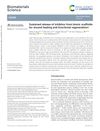 10 citations,
March 2022 in “Communications biology”
10 citations,
March 2022 in “Communications biology” A new non-invasive method can analyze skin mRNA to understand skin diseases better.
 July 2024 in “ADMET & DMPK”
July 2024 in “ADMET & DMPK” Surface-modified nanostructured lipid carriers can improve hair growth treatments.
 29 citations,
November 2022 in “Nature Medicine”
29 citations,
November 2022 in “Nature Medicine” Genetic variations greatly affect individual metabolism and can impact health and disease risk.
 57 citations,
June 2021 in “Science”
57 citations,
June 2021 in “Science” Women inventors focus more on women's health, but there are few of them.
 27 citations,
March 2013 in “Social Semiotics”
27 citations,
March 2013 in “Social Semiotics” Commercial hair loss websites promote Propecia by making men feel insecure about baldness and suggesting it's a medical issue needing treatment.
 47 citations,
January 2021 in “Fertility and Sterility”
47 citations,
January 2021 in “Fertility and Sterility” COVID-19 might affect male fertility, but more research is needed to understand the full impact.
 18 citations,
July 2020 in “Basic and Clinical Andrology”
18 citations,
July 2020 in “Basic and Clinical Andrology” Wait 3 months after COVID-19 before trying assisted reproduction and further research is needed on COVID-19's effects on male hormones and fertility.
 8 citations,
January 2020 in “Biomaterials Science”
8 citations,
January 2020 in “Biomaterials Science” Researchers developed a scaffold that releases a healing drug over time, improving wound healing and skin regeneration.
October 2017 in “British Journal of Dermatology” The document honored Yvonne, announced upcoming dermatology events, and introduced new journal editors.
 January 2013 in “The Journal of Sexual Medicine”
January 2013 in “The Journal of Sexual Medicine” The document suggests that finasteride may cause depression and suicidal thoughts, while prostate surgery does not harm sexual health.
 5 citations,
September 2019 in “ACS Applied Bio Materials”
5 citations,
September 2019 in “ACS Applied Bio Materials” The hydrogel with bioactive factors improves skin healing and regeneration.
 October 2024 in “Frontiers in Veterinary Science”
October 2024 in “Frontiers in Veterinary Science” FKBP10 and FBN2 are key proteins for hair growth in cashmere goats.
32 citations,
December 2019 in “The Journal of clinical investigation/The journal of clinical investigation” A protein called IL-36γ causes skin side effects from certain cancer treatments when combined with a common skin bacteria.
 5 citations,
February 2022 in “Acta Biomaterialia”
5 citations,
February 2022 in “Acta Biomaterialia” Nanomaterials can improve hair care products and treatments, including hair loss and alopecia, by enhancing stability and safety, and allowing controlled release of compounds, but their safety in cosmetics needs more understanding.
 2 citations,
December 2021 in “F1000Research”
2 citations,
December 2021 in “F1000Research” Most people in South India lack knowledge about managing COVID-19 at home.
 101 citations,
July 2020 in “Dermatologic therapy”
101 citations,
July 2020 in “Dermatologic therapy” COVID-19 can cause skin issues like rashes and "COVID toes," and people with skin conditions should adjust their treatments if they get the virus.
 36 citations,
October 2016 in “Bone”
36 citations,
October 2016 in “Bone” A male with aromatase deficiency improved bone health with estradiol treatment.
 December 2024 in “Frontiers in Endocrinology”
December 2024 in “Frontiers in Endocrinology” Continued research and awareness are needed to improve treatments for androgen-dependent diseases.
102 citations,
October 2010 in “Molecular Pharmaceutics” Copper-doxorubicin nanoparticles effectively treat tumors with less toxicity.
 March 2024 in “World Journal Of Advanced Research and Reviews”
March 2024 in “World Journal Of Advanced Research and Reviews” Educators who survived COVID-19 faced physical, psychological, and social challenges but overcame them with resilience and support, highlighting the need for schools to provide better health and psychological care.

Continuous research and innovative strategies are essential for sustainable development.
 9 citations,
March 2019 in “Anthropology and Medicine”
9 citations,
March 2019 in “Anthropology and Medicine” PCOS in India is linked to broader sociocultural and environmental changes, not just diet and exercise.
 33 citations,
February 2016 in “Journal of Experimental Botany”
33 citations,
February 2016 in “Journal of Experimental Botany” ROOT HAIR SPECIFIC 10 (RHS10) reduces the length of root hairs in Arabidopsis plants.
 141 citations,
September 2016 in “European Journal of Dermatology”
141 citations,
September 2016 in “European Journal of Dermatology” Taxane chemotherapy can cause skin, hair, and nail side effects, which are often under-reported and can affect patient quality of life.
 7 citations,
April 2022 in “South African journal of botany”
7 citations,
April 2022 in “South African journal of botany” Some Chrysanthemum samples from the USA, Europe, and China differ in quality and some contain harmful cadmium.
3 citations,
November 2022 in “International journal of environmental research and public health/International journal of environmental research and public health” Ethnic Indian women with PCOS often have early symptoms, delayed diagnosis, and need better information and support for treatment and lifestyle management.
2 citations,
January 2021 in “Clinical dermatology review” Modified PRP therapy successfully treated severe alopecia unresponsive to traditional methods.
January 2019 in “Journal of Dermatology and Dermatologic Surgery” Wearing headcovers doesn't affect male-pattern hair loss severity.
1 citations,
January 2021 in “Clinical dermatology review” Severe hair loss significantly worsens quality of life.
 14 citations,
January 2018 in “Endocrinology and Metabolism”
14 citations,
January 2018 in “Endocrinology and Metabolism” Many infertile women with PCOS in Central Vietnam have metabolic or insulin resistance syndrome, with obesity and older age increasing the risk.























